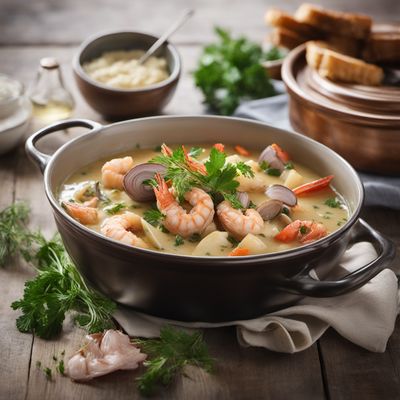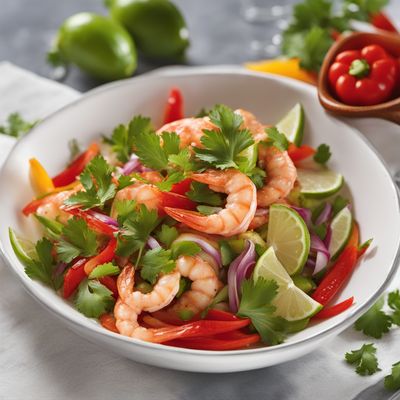
Ingredient
Scallop, sea
The Jewel of the Ocean
Scallops are bivalve mollusks with a creamy white flesh and a slightly sweet, briny taste. They have a firm yet tender texture, often described as buttery or melt-in-your-mouth. Their round, fan-shaped shells are usually discarded, as the edible part is the adductor muscle that holds the shells together. Scallops can be found in various sizes, from small bay scallops to larger sea scallops.
Origins and history
Scallops have a rich culinary history, dating back to ancient times. They were highly valued by the ancient Greeks and Romans, who considered them a delicacy. Scallops were also popular in medieval European cuisine and were often served at banquets and feasts. Today, scallops are enjoyed worldwide and are particularly prominent in coastal regions with abundant seafood resources.
Nutritional information
Scallops are a good source of protein, low in fat, and rich in essential minerals such as magnesium, potassium, and zinc. They are also a good source of vitamin B12 and omega-3 fatty acids, which are beneficial for heart health.
Allergens
Shellfish allergies are the most common allergenic reactions associated with scallops. Individuals with shellfish allergies should avoid consuming scallops or any dishes containing them.
How to select
When selecting scallops, look for ones that are firm and moist, with a sweet, fresh scent. Avoid scallops that have a strong fishy odor or are slimy to the touch. Opt for dry-packed scallops, which are free from any added preservatives or chemicals. Fresh scallops should have a translucent appearance and a creamy white color.
Storage recommendations
To maintain their freshness, store scallops in the coldest part of your refrigerator, ideally at a temperature between 32°F and 38°F (0°C and 3°C). Keep them in a sealed container or wrapped tightly in plastic wrap to prevent them from drying out. It is best to consume scallops within 1-2 days of purchase for optimal flavor and quality.
How to produce
Scallops are typically harvested from the wild, but they can also be farmed. If you have access to a suitable marine environment, you can cultivate scallops by providing them with a clean, nutrient-rich habitat and ensuring proper water quality. However, scallop farming requires specialized knowledge and equipment, so it is recommended to consult experts or join local aquaculture programs for guidance.
Preparation tips
Scallops can be prepared in various ways, including searing, grilling, baking, or poaching. They can be enjoyed on their own as a simple appetizer or incorporated into pasta dishes, stir-fries, or seafood stews. To enhance their natural sweetness, pair scallops with citrus flavors, herbs like thyme or tarragon, or a light buttery sauce. Avoid overcooking scallops, as they can become tough and rubbery.
Substitutions
Shrimp, prawns, or lobster can be used as substitutes for scallops in recipes. While they may not have the exact same taste and texture, they can provide a similar seafood experience.
Culinary uses
Scallops are widely used in various cuisines around the world. They are commonly pan-seared and served with a lemon-butter sauce or used in dishes like Coquilles Saint-Jacques (scallops gratin), ceviche, or sushi. In Asian cuisines, scallops are often stir-fried with vegetables or added to soups and hot pots. They are also a popular ingredient in pasta dishes, risottos, and salads.
Availability
Scallops are commonly available in coastal regions and are cultivated in countries such as the United States, Canada, Japan, China, and Peru.
More ingredients from this category

Scallop, queen
The Regal Delicacy of Queen Scallops

Scallop, australian
Ocean Gems: Discover the Exquisite Australian Scallops

Scallop, giant pacific
The Ocean's Delicacy: Unveiling the Majesty of Giant Pacific Scallops

Scallop, great
Oceanic Delicacy: Discovering the Great Scallop

Yesso scallop
The Ocean's Delicacy

Scallop, bay
The Ocean's Delicacy

Scallop, new zealand
The Ocean's Delicacy: Discovering the Flavors of New Zealand Scallops
Recipes using Scallop, sea

Maritime Povitnek Chowder
Seafood Delight: Maritime Povitnek Chowder

Tiella alla Silana with a New York Twist
Savory Seafood Delight: New York Style Tiella alla Silana

Peruvian Spicy Scallop Stew
Oceanic Fire: A Spicy Delight from Peru

Maritime Seafood Pies
Oceanic Delights: Maritime Seafood Pies

New England Style Seafood Fricassee
Oceanic Delight: New England Seafood Fricassee

New England Style Seafood Stew
Ocean Delight: A Taste of New England's Finest Seafood Stew

Chicago-style Kilawin
Lakefront Kilawin: A Chicago Twist on a Filipino Classic